Menu
Please click on a link to take you to each page.
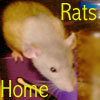
General Care
Personality/Habits
Lifespan
Nail & Teeth trimming
Baths
Introduction/Fighting
Quarantine
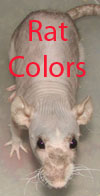
Colors & Markings
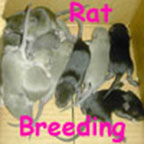
Sexing info
Pre-Breeding info
Pregnancy Info
Baby Info
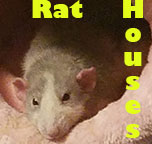


Health Tips
Eyes
Mycoplasma
Pneumonia
Temperature
Bugs
Veterinary Care
Abscesses & Tumors
Bumblefoot
Sprained ankles/Torn toenails
Wounds
Degloving/Tail injury
Aggression
Ears
Megacolon
Barbering
Old Age
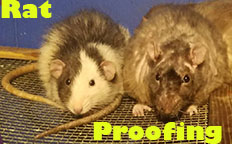
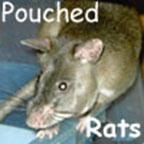




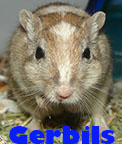
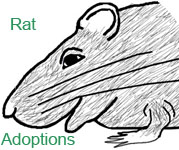


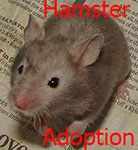

Please click on a picture to take you to each page
80stoysale.com HOME
Menu
Please click on a link to take you to each page.

General Care
Personality/Habits
Lifespan
Nail & Teeth trimming
Baths
Introduction/Fighting
Quarantine

Colors & Markings

Sexing info
Pre-Breeding info
Pregnancy Info
Baby Info



Health Tips
Eyes
Mycoplasma
Pneumonia
Temperature
Bugs
Veterinary Care
Abscesses & Tumors
Bumblefoot
Sprained ankles/Torn toenails
Wounds
Degloving/Tail injury
Aggression
Ears
Megacolon
Barbering
Old Age












Please click on a picture to take you to each page
80stoysale.com HOME
My Rats have taught me a lot over the years and i hope this site will help other rat owners care for their pets.
I was introduced to my first pet rat back in 1996. After he passed away i acquired more and more and was hooked. I was infected with GGMR -Gotta Get More rats Syndrome, i have been owned by rats ever since! I have never been ratless since and hope to never be!
I am a USDA licensed breeder for Guinea pigs, Hedgehogs, Egyptian Spiny Mice, African Soft Fur Rats, Roborovski Dwarf Hamsters, Winter White Dwarf Hamsters and Syrian Hamsters. I also breed Rats and mice. (which are not USDA regulated.)
I really enjoy arranging private adoptions and talking to other rattie owners.
I Breed for Health, Temperament and Longevity -and of course cuteness!
I have over 20 years experience with rats. Typically i care for over 100 Rats a month between my own and my jobs.
I let my rats free range for play time and usually have a mischief who is allowed to free range all the time except when another mischief is out. I have a Male group and a female group and sometimes another separate group if someone doesn't get along with the existing groups.
If the occasion arises i like to acquire rats who are elderly or have cosmetic problems (One eye, no toes, stub tail etc.) and try to give them good lives.
My Breeder rats are kept on a separate level of the house away from my pet rats who aren't bred.
I love all rodents!

Rats make wonderful pets, they make great Friends for people of all ages. They are a good size to be easy to handle by children or elderly, while Hamsters, Mice and Gerbils tend to be able to jump and wiggle away much quicker.
Pet rats are very clean and curious, they are not dirty filthy snarling animals, like the movies portray them to be!
Rats are very Intelligent. They learn quickly and act much like a small dog. They enjoy cuddling and playtime but are also comfortable doing their own rattie things while in their cage. Rats are fairly inexpensive to acquire and care for generally, but rats are prone to tumors and respiratory problems and may need to see a Vet in their lifetime. If you are unwilling to pay for medical bills if they arise please do not get a pet.
For anyone unsure about rats i suggest you just stop and take a look into their cute little faces!
It is common among the rat community to say that "You are owned by your rats", instead of saying "You own rats."
Once you get a rat, most people are hooked for life and will never be ratless again!
Click on the section you would like to visit or continue scrolling down the page.
General Care Personality/Habits Lifespan Nail & Teeth trimming Baths Introduction/Fighting Quarantine
Before you decide to bring a rat (or any animal) into your home be sure to think over the decision carefully.
Do you have enough time to spend with the animal?
Do you have enough money to pay for Vet bills if they arise?
Are you devoted to making a lifelong commitment to your rats happiness & to have them live with you their whole life?
* What to do with rat poison: If possible flush the poison down the toilet, or put it in a tightly sealed container. For glue traps fold the traps in half or stick them onto something else. Disable and disassemble spring loaded traps and throw them away.
By disposing of traps carefully this will decrease the likelihood of wild animals getting hurt.
When choosing a rat, if possible, use these tips:
If they are aggressive at the store/breeder they may be aggressive at home.
If you are acquiring a female rat, make sure that the female has been kept with only females, it is quite common for rat owners who acquire female rats from pet stores to bring them home and then days or weeks later the female suddenly gives birth.
It is also known to happen that pet stores will not know the correct gender of the animals. Such as you think you have two females, only to find out one is a male when you find babies.
Examine the rats closely to ensure you know just what gender they actually are.
Also when giving the rat a bath you can examine them more closely to look for scars, scratches, bumps or lumps that you may not have noticed earlier.
If you need to get a hold of the rat very quickly to prevent escape or injury try to grab for a foot rather then the tail.
(See the rat illnesses page to learn more about Degloving.)
Thus when trying new foods they have never eaten before, to prevent themselves from becoming sick they tend to take a small test bite and wait for several hours to make sure they don't get sick and then come back and finish the meal.
After a rat has eaten a certain type of food several times or if another rat in the pack sees another rat eating a new certain type of food they are more likely to eat it without testing it.
Rats determine a leader, and then everyone else falls into rank under them, if a rat dies or new rats come into the household, then the whole rank scale is upset, and needs to be determined again, sometimes everyone gets along and it's a perfect family, and sometimes a few rats will refuse to give up their higher ranking position and will fight with the new rat. Some rats will never get along, and are unable to live together.
There is also a risk when bringing in new pets of spreading illness -quarantining new rats is advised.
Rats sometimes will chew on each others necks, to play around, show affection and also sometimes to pick on the other rat. If you find scabs on your rats neck area, watch for signs of another rat chewing on them before suspecting bugs.
Rats are very friendly animals. They act much like small dogs.
Rats all have their own personalities, differences and similarities.
Some rats are super friendly and love to be held, while others only want to sit next to you and not on your lap, others may just not want to be bothered at the moment.
Some rats will take all the snacks you will give them and stash them away and keep coming back for more, while others only eat as much as they want and won't take anymore.
Some rats like to play or swim in water on occasion.
Different rats may like different things. (Such as different sleeping spots, foods or scratch areas.)
If one rat sees another rat eat or play with something they have not seen before, they may just play or eat the item, rather then testing it themselves.
Rats will chatter their teeth when they are happy or in severe pain. This is referred to as Bruxing.
Rats will bug out their eyes from time to time when they are content. This is called boggling.
Rats especially males urinate little droplets as they walk over things scent marking their territory.
Rats will also rub their necks and bodies on and over items to scent mark them.
*I observe scent marking most frequently if i let the girls out first, then when the boys come out they vigorously scent mark everything following the females scent trail.
It is common for rats to nibble on toes, fingernails and Band-Aids out of curiosity.
Some rats are very active and can jump long distances, most commonly a rat can jump about 2 feet, but on occasion they have been known to jump nearly 4 feet.
Some Furry rats enjoy getting their hair brushed. A doll brush works very well.
Rats can squeak and scream.
Rats will squeak when hurt, scared, fighting, or sometimes if startled.
Rats will scream if hurt, scared or if they come across a new rat or other pet that they have not seen before.
*I never heard a rat scream until one day i had Stormy, my Pouched rat & my boys out during free range time, these particular rats had never met before. The boys happened to find her and started screaming and squeaking. After i came over and introduced everyone, everything was fine, but i think the boys were just startled and in complete shock to come across such as big rat without warning! :)
Rats will yawn when they are tired or just waking up -a perfect opportunity to see their big teeth.
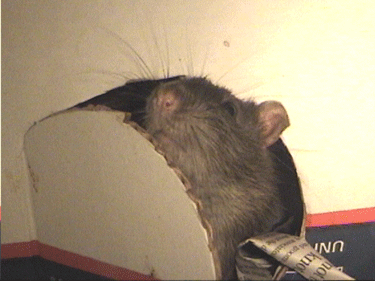
Unfortunately a rats life span is quite short.
On average rats live 1 1/2 - 3 years.
In rare cases they are rumored to live up to 4-5 years.
The oldest reported rat while "The Guinness Book of World Records" was still keeping track was 7 years 4 months old.
In the rat world community if you have a rat make it to 2 years you are considered lucky, if you have a rat make it to 3 years old you are considered very lucky, Anything over that and you are considered very, very lucky!
If possible try to get the exact date of birth of your pet from the place you are acquiring them from. Having an exact birth date can be helpful for celebrating rat birthdays and determining their age.
Just because your rat is not necessarily old, doesn't mean they can not suffer from old age symptoms.
The longevity of lifespan depends a lot on the genes, "Feeder" rats or rats not bred for health have a shorter lifespan, then rats bred for good health and long life.
A few ways to try to determine how old your rat is:
Some rats will trim their nails by biting them and some you will have to trim their nails with a clipper.
If your rat's nails become to long or sharp you will need to trim them with a small animal nail trimmer.
A human fingernail trimmer can be used but they cut straight rather then circular like the small animal trimmer. Using a human trimmer can cause nails to crack or split.
In order to tell if your rats nails are overgrown or to long, look at their nails, Their nails should start off on the toes pink referred to as the quick and as the nail get longer you should notice on the tips a white part, trim that off, be careful not to cut their nails to short, it will cause the rat pain and bleeding.
Do not trim any part of the pink. Rats nails/toes tend to bleed a lot and it can be tricky to get them to stop bleeding. (If you are unsure about nail trimming, most vets will trim small animals nails for fairly cheap)
If your rats nails are becoming sharp, you can put a rock or brick in the corner of their cage -or under the water bottle -a place they frequent often to help file their nails.
You can also use a nail file and file your rats nails -if they will let you :)
*If you happen to trim the rats nails to short and/or they start to bleed you can use blood stop, flour or chinchilla dust to stop and/or clot the bleeding.
A spot of super glue can also be used to stop bleeding.
A rat's nails can bleed a lot, so it may seem like a blood bath or massacre but don't freak out, the rat will clean the wound and it should clot and stop bleeding soon.
If the rat does start bleeding wrapping them in a towel will prevent blood from going everywhere.
Be sure to clean up the blood mess right away as blood attacks flies and mites.
On occasion rats can get a torn nail or hangnail from getting snagged on the carpet or hammock, trim those as needed.
*There are many types of small animal nail trimmers available, if possible buy one with a metal handle, the plastic ones sometimes are not strong enough and can break during trimming.
Here is a picture of a small animal nail trimmer. (available at pet stores).
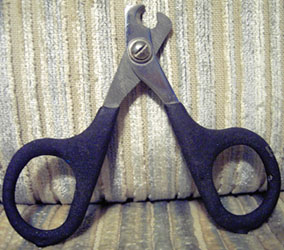
Rats will rarely need their teeth trimmed if they are eating and chewing properly.
Overgrown teeth are most common if:
Using a small animal nail trimmer, trim off the tips of the teeth -try to make them even and not jagged, but if you can't get them completely straight, don't worry about it as they should be able to grind them down by themselves.
Teeth trimming can be a two person job, if you have never done it before, you may need one person to hold the rat's body and arms still, while the other person holds the rats mouth open and tries to trim the teeth.
It is best to try to trim teeth, right after the rat wakes up, rather then when they are running around and fully awake. If they are groggy this will give you a few extra minutes of time before they start fighting you off. If the rat won't allow you to trim their teeth all at one time or are fighting you off, then let the rat go and try again in a little while after they settle down.
*A few people have had success trimming rats teeth by taking an old sock and cutting a small hole in the end large enough to cover the rats teeth, then stick the rats teeth through the hole and start trimming, by using this method this also insures the rats tongue will be out of the way and safe.
Rats can actually live a good long life if their teeth are properly trimmed and well managed even if they were born with a misaligned jaw or teeth.
Be sure to keep up with the trimming if the rat has overgrown teeth, they grow fast and will grow right into their cheek or down their throat, which can be extremely painful and cause them to be unable to eat.
*Lots of people are unable to trim rats teeth as they are squeamish about it, but remember the Rat has no nerves in their teeth and can not feel it, even if they squeak it is more then likely because you are holding them in place rather then that they are in pain. If you are unable to trim the ratties teeth on your own please find a Vet or a friend to help you, do not put it off, your rattie may suffer.
*I have had 3 rats now who were born with misaligned teeth and needed teeth trimming every 3-5 days. (2 were siblings) It can be a tedious task but they lived long lives because they got the care they needed.
Rinsing the rats tail or dunking their tail into cold water can also help to cool down an overheated rat.
Males, greasy orange hair and skin is often referred to as "Buck grease."
Also when picking out a shampoo try to get one that is safe to get near the eyes, as rats love to wiggle about in the bath and just to be on the safe side you want to be using a safe product.
"Seboloux Shampoo" is also a good product to use because it is safe to use on cuts and scrapes, such as cleaning bite wounds and breaking up scabs.
(It's really up to you to find what your rat likes/tolerates best.)
(Some rats will not tolerate blow dryers, since they can be rather loud.)
This is Rizzo styling his hair after a bath. :)
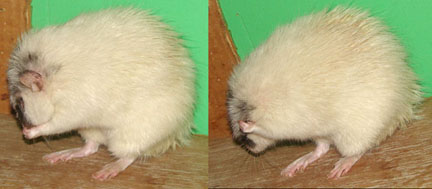
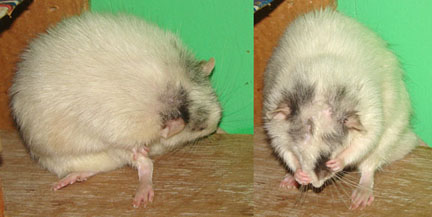
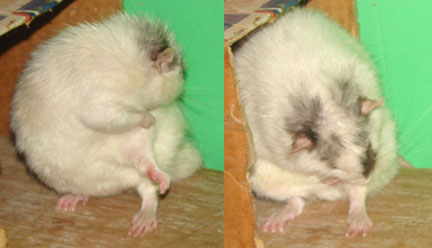
*My bathing method:
*I use Seboloux Shampoo on my rats with orange grease build up, and if the rats are just dirty with no grease build up then i use baby shampoo.
I run water over the rat for just a few seconds to get them wet, then i lather the soap on the rat and let the rat sit on my lap while i continuously lather the soap, i then get the water to lukewarm (Having the water the right temperature is very important, having the water too hot or cold will make the rat uncomfortable and try to get away more.) Then i hold the rat under the running water in the sink and rinse them thoroughly clean. I also try to clean as much of the dead skin and grime off of the rats tail as i can. Then i wrap them up in a towel and dry/fluff up their hair. Then i let the rat fix their own hair and then on occasion i brush their hair with a small doll brush.
(Example, one rat lives in the living room -his enemy so to speak lives in the bedroom. )
(Example: they act shy and scared for the first week or so, then all of a sudden turn into a outgoing friendly rat)
Rats love to play with each other, but occasionally the playfulness can turn into a fight and can get out of hand.
NEVER stick your hand in to break up rat fights, you may get bit or injured. (I have many of scars to prove this!)
A few things to try when trying to discourage a rat from chewing or fighting is:
You can also try separating fighting rats by wearing thick gloves or trying to cover/separate them with a towel or pillow and then scooping them away from the other rats involved.
Rats can bite very hard, a Rats teeth are actually stronger then an alligators and they can bite through Steel.
Be sure to take care of any injuries ASAP. (Yours or the rats)
Clean all rat wounds with wound cleaning solution such as Nolvasan solution/Chlorehexadine, salt water or saline solution. Hydrogen peroxide can be used but it dries out wounds so if using it, it is best to dilute it with a tiny bit of water and then rinse thoroughly after disinfecting.
Keep glue out of the ratties reach and hold the rat until glue is dry.
Super glue can be used to seal up wounds. Apply glue to one side of the wound and press the skin together.
If your rat loses a hair patch in a fight, it will more then likely grow back if you clean the wound regularly.
If your rat is seriously injured in a fight, please take them to a Vet immediately.
Some rats get along fine and then for unknown reasons they get upset and will start squeaking at each other and get big hair, i wouldn't be overly concerned if your rats get into some occasional roughhousing, it is usually a fight over food or territory.
Some rats with conflicting attitudes will never get along, and should never be left together.
Most commonly rats will end up fighting over food or sleeping areas, so make sure you pass out snacks and have enough places to hide for everyone.
If a rat fight occurs and their is blood in the cage or area be sure to clean it up right away as it can attack flies and mites.
If you are getting your first pet rats quarantine is not necessary -since there are no other rats presently in the home.
If you already have rats in your home, then there are many things you should be aware of, such as some illnesses and diseases can be transferred from your rats to the new rats, or from the new rats to your rats.
The first thing is to know your pets, make sure they are not sick or ill if you are planning on bringing more rats into your home.
If any of your rats have pneumonia -pneumonia can be transferred from rat to rat.
Be aware of mites, fleas, lice or other small bugs that could be hiding away on your new or old rats, they can be transferred from rat to rat.
Know where you are getting your rats from, the best place to get rats from is a breeder, most breeders have all their animals quarantined before bringing them into the home and before selling them to the public. Acquiring rats from a breeder is usually safer then if acquiring rats at a pet store. If acquiring your rats from a breeder who has already quarantined the rats, it is up to you if you would like to quarantine the rats at your home again or not. Different rats can be susceptible or immune to different illnesses.
If you are acquiring your rats from a breeder that also does rescues the risks can be higher, as rescues usually come from bad, unhealthy situations, make sure you have a thorough conversation with the breeder and ask about their quarantining rules, how long the animal has been in their care, if the animal has been checked and/or treated by a vet, and if they know any background or parents history about the animal.
To avoid your animals from becoming sick from interacting with other animals -do not bring your rats with you to a pet store. They could catch an illness if they interact with the other animals in the store.
If bringing your rat to the vet, make sure the rat is properly secured in some type of small animal carrier -the rat could get loose, the vet could have other predatory animals at the location and since a Vet is a prime location for sick animals, keeping your rat in a carrier will help prevent contact with germs that may be on the counters or floors.
Do not bring your rats to visit a friends house who also has rats, if they have gotten new rats within a minimum of 2 weeks.
There are a lot of rat owners out there that are very terrified of diseases and are persistent about quarantining your new rats in a separate location and air space, it is better to be safe then sorry if possible, but understandably not everyone has the luxury of time, money and space to quarantine at another location.
Different people use different precautions when it comes to quarantining -it all really depends on a persons personal preference.
Quarantining guidelines can be anywhere from 2 weeks to 4 weeks.
If you are an average pet owner quarantining for 2 weeks should be efficient enough, for breeder's and rescue organizations the quarantine period should be longer.
First know where your new rat is coming from, if it is in a cage with other sick, injured or ill rats quarantining is especially important to ensure the health of all of your rats.
Pet store rats are more prone to having diseases, as a lot of pet stores do not properly care for their animals or buy from bad distributors, resulting in poor health and a lowered immune system.
Rats from a feeder bin are also more likely to have health conditions as most of them are bred just for food purposes and are not bred for good health, long life or temperament.
When picking out a new rat, look over the rat carefully, watch for signs of aggression, wounds, sneezing or other health problems.
When bringing a new rat into the home i advise giving the rat a bath to wash off all the old smells, of past cage mates, bedding, litter and food. This also gives you a very good opportunity to thoroughly look over the rat to see any cuts, lumps or problems you may not have noticed earlier.
Keep the new rat if possible on a separate level of the house. If the house does not have multiple levels keep the quarantined rats in a separate room, preferably a room with a door, to ensure the room can be sealed off from the rest of the house.
Be sure to wash your hands thoroughly after handling all of your rats/animals.
Do not keep fans or humidifiers running in a quarantine room.
When cleaning cages in a quarantine cage or room, make sure to bag all of the used bedding securely in a bag and bring it outside as quick as possible.
Quarantining for Mycoplasma reasons is not necessary.
Almost all rats are infected with Mycoplasma, so if a rat is having a Myco flair up there is no reason to separate them from other rats, separating them could cause them more stress which could compromise their ability to fight off the infection. Rats with the similar genes or living conditions can have flair ups at the same time, due to poor lung function or low immune systems.
If a rat in your bunch has pneumonia, you might want to consider quarantining the ill rat. Pneumonia is transferable from rat to rat. The rats can be housed in the same room from each other if on opposite sides of the room, or not within sneezing distance. Pneumonia is usually transferred by rats sneezing on each other. After the rat with pneumonia has started being treated with antibiotics the rat can usually go back in with its other cage mates -ask your vet how many days you should wait until putting the ill rat back in with the others. Different medications effect rats at different rates, so the time frame of the pneumonia being contagious can vary.
Diseases like SDA & Sendai are airborne illnesses which can be transmitted through the air. The diseases being transmitted through the air is somewhat uncommon, most commonly rats are infected by petting an infected rat, then not washing your hands and petting another rat.
The bacteria from these diseases is stored in mucus glands such as your nose and behind your eyes.
The disease can be transferred if you are near an infected rat and then happen to sneeze near another rat.
SDA & Sendai can be life threatening. Most healthy adult rats can pull through, however babies, ill animals or elder rats have trouble fighting off these diseases. Both diseases cause the rats immune system to weaken, this allows other diseases to creep up quickly and may result in the animals death.
SDA & Sendai by themselves are usually not the direct cause of death, but they lower the immune system allowing other illnesses, such as a Myco flair up or pneumonia to attack furiously -which can result in death.
Sendai is detectable is rats for only 6 days after infected. SDA is detectable for 9 days after infected. After this amount of time they are considered to no longer be contagious -however the germs in their cage, on their houses, hammocks, toys, food dishes and water bottles -needs to be cleaned thoroughly, cleaned with bleach and then cleaned again, to ensure that the disease remnants are no longer in the house.
Once a rat has been infected with SDA or Sendai it is said they are then immune to that particular strain of the virus, however they still can be infected again if the strain of the disease is different.
If you happen to get a case of Sendai or SDA, you must quarantine the whole house, not allowing any animals to come in or leave the house, for at least a month -to ensure the disease is no longer present. You also need to clean and disinfect anything and everything the rats have had contact with.
The Sendai virus is most commonly found in Pigs (Not Guinea pigs).
If you have been around pigs or have been petting one -please change your clothes and wash your hands thoroughly before handling or interacting with your rats.
It is also recommended that you clean out your nasal passages -to ensure no bacteria is in there that can be transmitted to your rats. (Example: blowing your nose.)
Feel free to Email me if you have rat questions but Please try to look on my pages for the info first as my site is filled with lots of information.
Thank you!
!!!

The knowledge and information on all of my rat related pages is based on personal experience or is general information i have collected from other rat owners and may not be true in all cases.
Please consult a Vet when and if necessary or possible to ensure your rat receives the best care.
I also want to point out that my pages are to help fellow pet rat owners and the information contained on these pages does not necessarily relate to a breeder's views.
Click here to Watch my animal kids on YouTube.
Email: DiscoPanth@gmail.com
Please visit all my Pages!
HOME